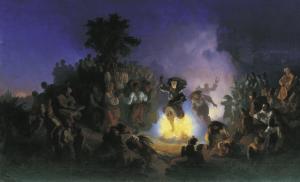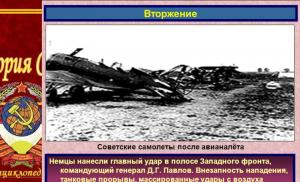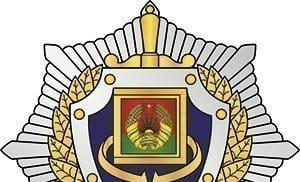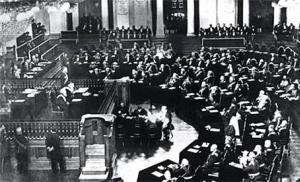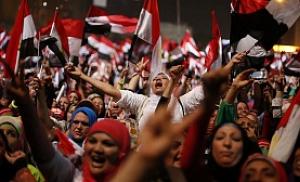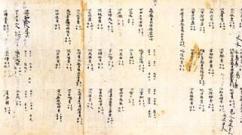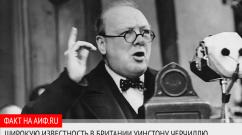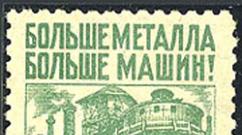Destruction of militants in Chechnya. Destroyed Chechen fighters
The list includes the most notable and significant operations of the FSB in the entire history of its existence. It does not contain cases of catching spies and other little-known operations, due to the fact that from the mid-1990s to our time, the main focus of the FSB is the North Caucasus. It is the elimination and capture of key opponents in this region that has a decisive influence on the development of the situation in the entire direction. Places are distributed according to the significance of the object of the operation or the situation as a whole.
10. Detention of Magas Ali Musaevich Taziev (formerly known as Akhmed Evloev; call sign and nickname - "Magas") - - a terrorist, an active participant in the separatist movement in the North Caucasus in the 1990s - 2000s, an Ingush field commander, since 2007 of the year - the commander (supreme amir) of the armed formations of the self-proclaimed "Caucasian Emirate". He was the second in the leadership hierarchy of the Caucasus Emirate after Doku Umarov. It turned out that since 2007, Ali Taziev, under the surname Gorbakov, lived in one of the private houses in the suburbs of the Ingush city of Malgobek. He introduced himself to his neighbors as a migrant from Chechnya. He behaved quietly and inconspicuously and did not arouse any suspicions. The operation to capture Magas began six months before his arrest. Three times he fell into the sights of snipers, but the order was to take him alive. On the night of June 9, 2010, the house was surrounded by the FSB special forces. At the moment of detention, Taziev did not have time to resist (according to Kavkaz-Center, due to the fact that he was poisoned), the FSB officers did not suffer any losses

9. Elimination of Abu Hafs al-Urdani Abu Hafs al-Urdani - Jordanian terrorist, commander of a detachment of foreign volunteers in Chechnya, took part in the battles on the side of the separatists during the First and Second Russian-Chechen wars. After the death of Abu al-Walid, Abu Hafs replaced him as Amir of foreign fighters and coordinator of financial flows from abroad. Led the attack of militants on the village. Avtury of the Shali region in the summer of 2004, as well as many smaller attacks by militants. Abu Khafs as a military strategist was valued by Aslan Maskhadov, who jointly planned operations with him. On November 26, 2006, Abu Khafs and four other militants were blocked in one of the private houses in the city of Khasavyurt (Dagestan). As a result of the storming of the house by the special forces of the FSB, all the militants were killed.

8. Elimination of Abu Dzeit Abu Dzeit (known as Little Omar, Abu Omar of Kuwait, Hussein, Moor) is an international terrorist, an emissary of the Al-Qaeda organization in the North Caucasus, an organizer of terrorist acts in Bosnia and the Caucasus, including in Beslan. According to some reports, he personally met with Osama bin Laden. In 2002, he was invited to Chechnya by one of the emissaries of Al-Qaeda, Abu Haws. He was a demolition instructor in one of the terrorist camps. Then he was sent by the representative of Abu Khavs in Georgia, to Ingushetia. In 2004, Mavr became the head of an al-Qaeda cell in Ingushetia. He died during an operation to eliminate militants on February 16, 2005 in the Nazran district of Ingushetia.

7. Elimination of Abu-Kuteib Abu-Kuteib is a terrorist, one of Khattab's close associates. He was a member of the "Majlisul Shura of Ichkeria" and was responsible for the propaganda support of the activities of gangs, and was also endowed with the exclusive right to post information on the Internet transmitted by groups of Arab mercenaries from Chechnya. It was he who, in March 2000 in Zhani-Vedeno, organized an attack on a convoy, as a result of which 42 riot policemen from Perm were killed. He was one of the organizers of the militants' invasion of Ingushetia. On July 1, 2004, he was blockaded in the city of Malgobek and, after many hours of fighting, blew up the "shahid's belt" on himself.

6. Liquidation of Aslan Maskhadov Aslan Maskhadov - military and statesman unrecognized Chechen Republic of Ichkeria (ChRI). In the early 1990s, he participated in the creation of the armed forces of the CRI and led the military operations of the separatists against the federal forces. one of the distant relatives. During the assault, Maskhadov resisted, and the special forces blew up the device, from the shock wave of which the house was dilapidated.

5. Liquidation of Arbi Baraev Arbi Baraev, a member of the separatist movement in Chechnya in the 1990s, supported the creation of a "Sharia" state in Chechnya. After the end of the first Chechen war, in 1997-1999, he gained fame as a terrorist and a bandit, a murderer and leader of a gang of slave traders and kidnappers, at the hands of which more than a hundred people suffered in Chechnya and neighboring regions. The liquidation of the Chechen field commander Arbi Baraev was the result of special operation of the FSB and the Ministry of Internal Affairs of Russia, which took place from June 19 to 24 in the village of Alkhan-Kala. During the operation, Arbi Baraev and 17 militants from his inner circle were killed, many were taken prisoner, the federal forces lost one person killed during the operation.

4. The liquidation of Dzhokhar Dudayev Dzhokhar Dudayev is a Chechen military and political figure, the leader of the Chechen national liberation movement of the 1990s, the first president of the unrecognized Chechen Republic of Ichkeria. In the past - Major General of Aviation, the only Chechen general in the Soviet Army. According to Russian sources, by the beginning of the first Chechen campaign under the command of Dudayev there were about 15 thousand fighters, 42 tanks, 66 infantry fighting vehicles and armored personnel carriers, 123 guns, 40 anti-aircraft systems, 260 training aircraft, so the advance of the federal forces was accompanied by serious resistance from the Chechen militias and guardsmen Dudayev. On the evening of April 21, 1996, Russian special services located the signal from Dudayev's satellite phone near the village of Gekhi-Chu, 30 km from Grozny. 2 Su-25 attack aircraft with homing missiles were lifted into the air. Dzhokhar Dudayev died from a rocket explosion while talking on the phone with Russian MP Konstantin Borov.

3. Elimination of Khattab Amir ibn al-Khattab - a field commander, a terrorist originally from Saudi Arabia, one of the leaders of the armed formations of the self-proclaimed Chechen Republic of Ichkeria on the territory Russian Federation in 1995-2002. He was an experienced and well-trained terrorist, owned all types of small arms. Understood in mine-subversive business. He personally trained suicide bombers subordinate to him. He organized foreign financing for the purchase of ammunition and the arrangement of camps for the training of militants on the territory of Chechnya. Khattab was destroyed in an unconventional way: a messenger delivered a message to the Arab, which contained a horse dose of potent poison. Khattab opened the envelope and died very quickly after that. His bodyguards could not understand what was really happening.

2. Elimination of Shamilya Basaev Shamil Basaev - an active participant in the hostilities in Chechnya, one of the leaders of the self-proclaimed Chechen Republic of Ichkeria (CRI) in 1995-2006. He organized a number of terrorist acts on the territory of the Russian Federation. He was included in the lists of terrorists of the UN, the US State Department and the European Union. According to official data from the FSB, Basayev and his accomplices were destroyed during the explosion of a KamAZ truck filled with explosives in the Nazranovsky district of Ingushetia. This explosion was the result of a carefully planned special operation, which became possible thanks to the operational work of the Russian special services carried out abroad. “Operational positions were set up abroad, primarily in those countries where weapons were collected and subsequently delivered to Russia for terrorist attacks,” Mr. Patrushev said, adding that Basayev and his accomplices were going to carry out a major terrorist attack in order to exert political pressure. on the leadership of Russia during the G8 summit.

1. Capture of "Nord-Ost" The terrorist attack on Dubrovka, also referred to as "Nord-Ost" - a terrorist attack on Dubrovka in Moscow, which lasted from October 23 to 26, 2002, during which a group of armed militants led by Movsar Baraev captured and held hostages from among the audience of the musical "Nord-Ost". The assault began at 05.17, when the special forces began to launch a special nerve-paralytic substance through the ventilation shafts. At that moment, several hostages called their acquaintances and said that some kind of gas was coming to the recreation center, but their speech quickly became incoherent, and then they could not utter anything at all. The gas suppressed the will of all those present in the hall, and most importantly, the terrorists. If even one of them managed to press a few toggle switches on her belt or connect the wires, the bombs would explode one after another, and the building could simply collapse. A few seconds after the gas began to act, the snipers killed all the female suicide bombers with accurate shots to the head, and then the fighters in gas masks moved on to destroy the other bandits who were in the auditorium. One of them was armed with a Kalashnikov machine gun, but he did not have time to use it, making only one aimless burst. At the same time, part of the special forces who entered the building through the roof dealt with the terrorists in the utility rooms on the second floor, using noise and light grenades. Most of the bandits at the same time were already in an unconscious state, since the gas acted primarily on those.
The first big success in decapitating Chechen separatism after the assassination of Dzhokhar Dudayev was the capture of terrorist No. 2 Salman Raduev, who was arrested by the FSB in Chechnya in March 2000. Raduev became widely known in 1996, after on January 9, under his leadership, militants attacked the Dagestan city of Kizlyar. True, "laurels of fame" in Kizlyar went to Raduev "accidentally". At the last stage, he replaced the wounded field commander Khunkarpasha Israpilov, who was the head of the operation.
The capture of Raduev was masterfully carried out by counterintelligence agents and in such a top-secret regime that the bandit "did not expect anything and was shocked," said FSB director Nikolai Patrushev. According to some reports, Raduev was "tied up" at the moment when he left his shelter "out of need." There is a version that Raduev was handed over by an agent who promised him to sell a large batch of weapons cheaply.
On December 25, 2001, the Supreme Court of Dagestan found Raduev guilty on all counts, except for "organizing illegal armed groups." The demands of the public prosecutor - Vladimir Ustinov - were met, and Salman Raduev was sentenced to life imprisonment. Raduev served his term in the Solikamsk UIN, in the famous colony "White Swan".
In December 2002, Raduev began to complain about his health. On December 6, he developed bruises under his left eye and abdominal pain. A few days later, Raduev became worse, and on December 10, the GUIN doctors decided to place him in a prison hospital in a separate ward. In the hospital, Raduev died on December 14 at 5.30 in the morning. The following is written in the forensic medical conclusion about death: "DIC, multiple hemorrhages, abdominal hematoma, hemorrhage in the brain and left eye."
Raduev's body was buried at the Solikamsk common cemetery.
In April 2002, it became known that field commander Khattab, who was known as an ideologist and organizer of terrorist activities, was killed in Chechnya. It was liquidated as a result of an "intelligence-combat operation" by the FSB back in March 2002. The top-secret operation to destroy Khattab had been in preparation for almost a year. According to the FSB, Khattab was poisoned by one of his confidants. The death of a terrorist was one of the most serious blows for the militants, since after the liquidation of Khattab, the entire system of financing gangs in Chechnya was disrupted.
In June 2001, in Chechnya, as a result of a special operation, the leader of one of the most combat-ready units of Chechen militants, Arbi Baraev, was killed. Together with him, 17 people from his inner circle were killed. A large number of militants were taken prisoner. Baraev was identified by his relatives. The special operation was carried out in the area of the native village of Baraev Yermolovka for six days - from June 19 to 24. During the operation, which was carried out by the regional operational headquarters with the involvement of special forces of the FSB and the Russian Ministry of Internal Affairs, in particular, the Vityaz group, one Russian serviceman was killed and six were injured. After Baraev was mortally wounded, the militants carried his body into one of the houses and covered it with bricks in the hope that the federal forces would not find him. However, with the help of a search dog, Baraev's body was found.
In November 2003, representatives of the FSB officially admitted that one of the leaders of the Chechen fighters, the Arab terrorist Abu al-Walid, was killed on April 14th. According to the intelligence services, on April 13, information appeared about a detachment of militants who, together with several Arab mercenaries, stopped in the forest between Ishkha-Yurt and Alleroy. This area was immediately attacked from helicopters, and the special forces shot the camp of bandits from grenade launchers and flamethrowers. On April 17, soldiers combed the area between Ishkhoy-Yurt and Meskets, and about 3-4 kilometers from these villages, six dead militants were found in the forest. We managed to identify everyone - they turned out to be Chechens. A kilometer away from those six corpses, a dead Arab was found. With him, in particular, they found a map of the area made from a satellite and a satellite navigator for moving around the area. The body was badly burned. In April, al-Walid's body could not be identified. The special services did not have the terrorist's fingerprints, his relatives did not respond to investigators' requests, and the detained militants who met with him could not say with certainty that the body was his. All doubts disappeared only in November.
On February 13, 2004, Zelimkhan Yandarbiev was killed in Qatar, whom the Chechen separatists, after the death of Dzhokhar Dudayev, declared the president of Ichkeria. Yandarbiev's car was blown up in the Qatari capital Doha. At the same time, two people from his escort were killed. The separatist leader himself was seriously injured and died in the hospital some time later. Yandarbiev has lived in Qatar for the past three years and has been on the international wanted list all this time as the organizer of the attack on Dagestan. The Russian Prosecutor General's Office demanded that Qatar extradite him.
The Qatari special services immediately started talking about the Russian trace in the murder of Yandarbiyev, and already on February 19, three employees of the Russian embassy were arrested on suspicion of committing a terrorist attack. One of them, who is the first secretary of the embassy and has diplomatic status, was released and expelled from the country, while the other two were sentenced by a Qatari court to life imprisonment, while the court concluded that the order to liquidate Yandarbiev was given by the first persons of the Russian leadership. Moscow denied the accusations in every possible way, and Russian diplomats did everything possible to bring the unfortunate bombers back to their homeland as soon as possible.
They were sentenced to life in prison, which under Qatari law means a 25-year prison term, which can later be reduced to 10 years. A month after the trial, an agreement was reached that the convicted Russians would be taken to their homeland, where they would serve their term. The return of the Russian scouts really took place, Anatoly Yablochkov and Vasily Pugachev flew to Russia on a special flight of the Rossiya State Customs Committee in December 2004.
In March 2004, it became known about the death of a no less odious leader of the militants - Ruslan Gelaev, who in May 2002 was newly appointed commander-in-chief of the armed forces of Ichkeria by Aslan Maskhadov and reinstated in the rank of "brigadier general". True, he was killed not as a result of a special operation by special services, but in a banal shootout with border guards. Gelaev was destroyed by a border detachment consisting of only two people in the mountains of Dagestan on the Avaro-Kakheti road leading to Georgia. At the same time, the border guards themselves were killed in the shootout. The corpse of the field commander was found in the snow a hundred meters from the bodies of the border guards. It happened, apparently, on Sunday (February 28, 2004). A day later, Gelaev's body was taken to Makhachkala and identified by the previously arrested militants.
Thus, only one "odious militant" remains alive among the major Chechen leaders - Shamil Basayev.
Alexander Alyabiev
A selection of the most noisy and explosive special operations of the Russian special forces in the Caucasus (Dagestan, Ingusheniya, KBR) for last years. Over the past couple of years, our special forces have been increasingly using drones, robots and other electronic innovations. The militants are also not far behind: they build strong bunkers and dig underground passages. See also selections for 2009-2015 (44 videos, highly recommended if you have not seen or read).
There are many special operations, so the employees do not risk in vain and with especially strong resistance, they simply methodically destroy the house along with the militants. Bulldozers are used to further clear the rubble. If the found IEDs cause concern, they explode on the spot.
In most of the videos, there is liquidation of members of gangs of groups or "changed shoes" into ISIS militants (an organization banned in the Russian Federation) or Vilayat Kavkaz bandits, etc. extremist organizations.
During the assault, three bandits were killed - two militants and an accomplice, the owner of the household, who took an active part in the shootout.
Special operation in Andi, 03/24/2018
The special forces of the FSB of Russia, with the support of the National Guard and the internal affairs bodies, blocked the house where the bandit was hiding. The criminal, who refused to lay down his arms and surrender to the authorities, was neutralized during the clash. According to available operational data, this is Yunus Khabibov, who was on the federal wanted list, who swore allegiance to the international terrorist organization ISIS (an organization banned in the Russian Federation) and carried out its instructions as the leader of a bandit group that previously operated in a mountainous wooded area.
Special operation in the village of Talgi on December 3, 2016. + Drilling a bunker with militants to undermine.
The amir of the Caucasus vilayat was destroyed.
The houses where the armed bandits were hiding were blocked by the special forces of the FSB of Russia, the residents of nearby houses were evacuated. The militants were asked to lay down their arms and surrender to the authorities, to which they refused and opened fire on law enforcement officers. As a result of the clash, two bandits were neutralized. Their identities are predetermined. According to reports, they were members of a gang that committed terrorist crimes in the North Caucasus Federal District. During the inspection of the house, a cache with a large number of weapons and ammunition was discovered. FSB officers seized from it two IEDs with a total capacity of about 20 kg in TNT equivalent, installed on the unrecoverable.
FROM special operation of the FSB RD in Makhachkala 07.05.2015
Rosh in RD received information about being in one of the apartments of a multi-storey building on the street. Akhmedkhan Sultan in Makhachkala of several armed persons involved in the activities of the gangster underground. To prevent bloodshed, the bandits were asked to lay down their arms and surrender to the authorities. They were persuaded to let the owner's wife out of the blockaded premises. The civilians living in the house have been evacuated. During the clash, three bandits were neutralized, weapons and ammunition were found on the spot.
Special operation of the FSB and the Ministry of Internal Affairs of the Republic of Dagestan in Makhachkala, Republic of Dagestan 09/07/2016
The building where the bandits took refuge was blocked by law enforcement forces. Nearby residents have been evacuated. At the suggestion of law enforcement officers to surrender, the bandits opened fire from automatic weapons. Three militants were neutralized by special forces.
Special forces of the FSB and the Ministry of Internal Affairs of Russia a private house, where the armed militants had taken refuge, was blocked. The area adjacent to it is cordoned off. The head of the ROSH introduced the CTO legal regime from 16.00. Nearby residents have been evacuated. At the legitimate demands of law enforcement officers to lay down their arms and surrender to the authorities, the bandits opened fire from automatic weapons. The special forces of the FSB and the Ministry of Internal Affairs were forced to start suppressing the bandits by force. three bandits were neutralized, including the gang leader Kamil Magomedov, born in 1986. It was established that this bandit group committed numerous encroachments on the lives of law enforcement officers and robbery attacks on civilian population, including the explosion in March of this year. convoys with military personnel of the Ministry of Internal Affairs of Russia.
On January 15, in Nalchik, in connection with the discovery of an armed person in one of the private houses in the city of Nalchik, who refused to lay down his arms and opened fire on law enforcement officers, the CTO legal regime was introduced. On the morning of January 16, armed resistance to the forces of law and order continued, but by 15.00 it was broken. Neutralized one of the members of the bandit underground operating in the territory of the republic.
In the course of carrying out operational activities, security agencies in cooperation with the Ministry of Internal Affairs of the Republic of Ingushetia on April 6 in the village of Ekazhevo, Nazran District, on the territory of a private house, a bandit arsenal with a large number of weapons and means of destruction was discovered and neutralized. According to preliminary data, the found cache belonged to the bandits of the Imarat Kavkaz MTO, most of the leaders and members of which were previously destroyed during the KTO and special operations.
Special operation of the UFSB, UFSVNG and the Ministry of Internal Affairs of the Republic of Dagestan in Khasavyurt, 01/29/2017
During the active ORM, the security agencies received information about the presence in one of the private houses on Keldysh Street in the city of Khasavyurt of a group of armed persons involved in committing terrorist crimes. In response to the legitimate demands of law enforcement officials to lay down their arms and surrender to the authorities, the criminals opened fire. As a result of the ensuing combat contact, three bandits were neutralized.
Special operation of the FSB and the Ministry of Internal Affairs of the Republic of Dagestan in Gimry 10.10.2015
In the course of active ORM, information was received about the possible presence of members of the gang underground in one of the private houses in the village of Gimry, Untsukulsky district. The head of the ROSH in the Republic of Dagestan decided to conduct a CTO from 6 hours 40 minutes and introduce an appropriate legal regime. The territory adjacent to the house was blocked, and civilians were evacuated. After firing was opened from the house in response to an offer to surrender, the KTO moved into an active phase. As a result of the battle, three bandits who offered armed resistance were neutralized.
On the night of April 22, 1996, the first president of the Republic of Ichkeria, Dzhokhar Dudayev, was killed near the village of Gekhi-Chu. It was destroyed by a missile guided by a satellite phone signal. His place was taken by Zelimkhan Yandarbiyev, and after the 1996 elections. - Aslan Maskhadov.
On May 24, 2001, one of the Chechen field commanders, Magomed Kariev, was found dead in Baku. According to police, Kariev was shot and killed at the door of an apartment he rented in Baku. The killer used a TT pistol, he made a control shot in the back of the head of his victim.
June 24, 2001 in the Chechen village of Alkhan-Kala, as a result of a week-long operation by federal troops, one of the most odious field commanders, Arbi Baraev, was wounded. He managed to escape, but later died of his wounds.
November 1, 2001 in Chechnya, one of the most famous spiritual leaders of the militants, Magomed Dolkaev, was killed.
April 25, 2002 the federals reported the death of Khattab, a representative of Al-Qaeda in the North Caucasus. A video of his body was later shown. According to one version, he was poisoned by a secret agent who managed to infiltrate the field commander's entourage.
On August 8, 2002, Turpal-Ali Atgeriev died of leukemia in the Sverdlovsk colony. In the government of Ichkeria, he served as Deputy Prime Minister. An accomplice of Raduev, who commanded one of the detachments during the attack on Kizlyar in 1996. HE was detained by the FSB in October 2000 and sentenced to 15 years in prison.
On October 26, 2002, Movsar Baraev, Arbi Baraev's brother, was killed during an assault by the Nord-Ost special forces.
On the night of December 12-13, 2002 Salman Raduev died in the special regime colony "White Swan" (Solikamsk, Perm region), who was found guilty of organizing the deliberate killings of civilians and police officers, organizing hostage-taking in Kizlyar and Pervomaisky in Dagestan in January 1996, and also in organizing an explosion at the Pyatigorsk railway station in the summer of 1995.
On February 13, 2004, a car was blown up in Qatar former president self-proclaimed Chechen Republic of Ichkeria Zelimkhan Yandarbiev, after which he died in the hospital. It is assumed that the explosion was prepared by FSB officers, who were subsequently sentenced to life imprisonment by a Qatari court, but they were soon extradited to Russia.
February 28, 2004 in the mountains of Dagestan, field commander Ruslan Gelaev, known for his campaign against Abkhazia, was shot almost by accident by two border guards.
On April 16, 2004, during a rocket attack on one of the mountainous regions of Chechnya, Abu al-Walid, who replaced Khattab as the curator of the separatists, was killed.
On June 2, 2004, as a result of a special operation in the city of Malgobek, law enforcement agencies managed to eliminate the well-known Arab mercenary Abu Kuteiba, who was responsible for numerous terrorist attacks in Chechnya.
And finally, on February 16, 2005, a citizen of Saudi Arabia, Abu Dzeit, was killed in Ingushetia, who was involved in almost all the latest terrorist attacks: Beslan, the attack on Ingushetia, the explosion of a hospital in Mozdok. During the investigation, it was established that Abu Dzeit was the so-called "amir" of the Caliphate bandit group and was an emissary of the Al-Qaeda international terrorist organization.
MASKHADOV Aslan (Khalid) Alievich Elected in 1997 President of the Chechen Republic of Ichkeria. Was born on September 21, 1951 in Kazakhstan. In 1957, together with his parents, he returned from Kazakhstan to his homeland, to the village of Zebir-Yurt, Nadterechny district of Chechnya. In 1972 he graduated from the Tbilisi Higher Artillery School and was sent to the Far East. He went through all the steps of the army hierarchical ladder from the platoon commander to the division chief of staff.
In 1981 he graduated from the Leningrad Artillery Academy. M.I. Kalinina. After graduating from the academy, he was sent to the Central Group of Forces in Hungary, where he served as a division commander, then as a regimental commander. Hungary is followed by Lithuania: the commander of a regiment of self-propelled artillery installations, the chief of staff of the missile forces and artillery of the garrison of the city of Vilnius in Lithuania, the deputy commander of the seventh division in the Baltic military district.
In January 1990, during the speeches of supporters of Lithuanian independence, Maskhadov was in Vilnius.
Since 1991 - Head of the Civil Defense of the Chechen Republic, Deputy Head of the General Staff of the Supreme Council of the Chechen Republic.
In 1992 Colonel Maskhadov resigned from Russian army and took up the post of first deputy chief of the General Staff of the Chechen Republic.
Since March 1994 - Chief of the General Staff of the Armed Forces of the Chechen Republic.
From December 1994 to January 1995 he led the defense of the presidential palace in Grozny.
In the spring of 1995, Aslan Maskhadov led the military operations of the armed formations from the headquarters in Nozhai-Yurt.
In June 1995, he headed the headquarters of the Dudayev formations in Dargo.
In August-October 1995, he headed a group of military representatives of the Dudayev delegation at the Russian-Chechen negotiations.
In August 1996, he represented Chechen separatists in negotiations with Alexander Lebed, Secretary of the Security Council
On October 17, 1996, he was appointed to the post of Prime Minister of the coalition government of Chechnya with the wording "for a transitional period."
In December 1996, in accordance with the election law, he resigned from official posts - Prime Minister of the coalition government, Chief of the General Staff of the Armed Forces, Deputy Commander-in-Chief of the Armed Forces of the Chechen Republic of Ichkeria, in order to have the right to run for the presidency of Chechnya.
From July 1998, he served as acting prime minister of Chechnya, combining this position with the post of president.
In December 1998, under the pretext of his "pro-Russian position", Maskhadov's constitutional powers were challenged by "field commanders" Shamil Basayev, Salman Raduyev and Khunkar Israpilov. The "Council of Commanders of Chechnya" headed by them demanded from the Supreme Sharia Court that Maskhadov be removed from office. The Sharia court suggested that Maskhadov unilaterally break off relations with Russia. However, the court did not find sufficient grounds to remove the president of the Chechen Republic from office, although he was found guilty of recruiting people who "collaborated with the occupation regime" for leadership positions.
It was destroyed on March 8, 2005 by the special forces of the FSB of Russia in the village of Tolstoy-Yurt, Grozny region.
Baraev Arbi. He was suspected of organizing the kidnappings of FSB officers Gribov and Lebedinsky, the plenipotentiary representative of the President of the Russian Federation in Chechnya Vlasov, employees of the Red Cross, as well as the murder of four citizens of Great Britain and New Zealand (Peter Kennedy, Darren Hickey, Rudolf Pestchi and Stanley Shaw). The Interior Ministry put Barayev on the federal wanted list in connection with the kidnapping of NTV journalists Masyuk, Mordyukov, Olchev and OPT TV journalists Bogatyrev and Chernyaev in Chechnya. In total, on his personal account, the death of about two hundred Russians - military personnel and civilians.
On June 23-24, 2001, in the ancestral village of Alkhan-kala and Kulary, a special combined detachment of the Ministry of Internal Affairs and the FSB carried out a special operation to eliminate a detachment of Arbi Baraev's militants. Destroyed 15 militants and Barayev himself.
BARAEV Movsar, nephew of Arbi Baraev. Movsar received his first baptism of fire in the summer of 1998 in Gudermes, when the Barayevites, together with the Urus-Martan Wahhabis, clashed with fighters from the detachment of the Yamadayev brothers. Then Movsar was wounded.
After the introduction of federal troops into Chechnya, Arbi Baraev appointed his nephew the commander of a sabotage detachment and sent him to Argun. In the summer of 2001, when Arbi Baraev was killed in the village of Alkhan-Kala in the Grozny rural district, Movsar proclaimed himself the emir of the Alkhan-Kala jamaat instead of his uncle. He organized several attacks on federal convoys and a whole series of explosions in Grozny, Urus-Martan and Gudermes.
In October 2002, terrorists led by Movsar Barayev seized the building of the House of Culture of the State Bearing Plant on Melnikova Street (Dubrovka Theater Center) during the musical "Nord-Ost". Spectators and actors (up to 1000 people) were taken hostage. On October 26, the hostages were released, Movsar Baraev and 43 terrorists were killed.
Suleimenov Movsan. Nephew of Arbi Baraev. He was killed on August 25, 2001 in the city of Argun during a special operation by officers of the Russian FSB Directorate for Chechnya. The operation was carried out in order to establish the exact location and detention of Suleimenov. However, during the operation, Movsan Suleimenov and three other mid-level commanders offered armed resistance. As a result, they were destroyed.
Abu Umar. A native of Saudi Arabia. One of the most famous assistants of Khattab. Explosives expert. Mined the approaches to Grozny in 1995. Participated in the organization of explosions in Buynaksk in 1998, was wounded during the explosion. He organized an explosion in Volgograd on May 31, 2000, in which 2 people died and 12 were injured.
Abu Umar trained almost all the organizers of the explosions in Chechnya and the North Caucasus.
In addition to preparing terrorist attacks, Abu-Umar dealt with financing issues
militants, including the transfer of mercenaries to Chechnya through the channels of one of
international Islamic organizations.
Destroyed on July 11, 2001 in the village of Mayrup, Shali district, during a special operation by the FSB and the Russian Ministry of Internal Affairs.
Emir Ibn Al Khattab. A professional terrorist, one of the most implacable militants in Chechnya.
The most "famous" operations conducted under the leadership or with the direct participation of Khattab and his militants include:
The terrorist attack in the city of Budyonnovsk (70 people stood out from the Khattab detachment, there were no losses among them);
Providing a "corridor" for the gang of S. Raduev to leave the settlement. Pervomaiskoye - an operation prepared and personally carried out by Khattab to destroy the column of the 245th motorized rifle regiment near the settlement. Yaryshmardy;
Direct participation in the preparation and attack on Grozny in August 1996.
The terrorist attack in the city of Buynaksk on December 22, 1997. During an armed attack on a military unit in the town of Buynaksk, he was wounded in his right shoulder.
Raduev Salman. From April 1996 to June 1997, Raduev was the commander of the armed unit "Army of General Dudayev".
In 1996-1997, Salman Raduev repeatedly claimed responsibility for the terrorist attacks committed on the territory of Russia and made threats against Russia.
In 1998, he claimed responsibility for the assassination attempt on Georgian President Eduard Shevardnadze. He also claimed responsibility for the explosions at railway stations in Armavir and Pyatigorsk. Raduev's gang was engaged in robbery on the railways, it is guilty of embezzlement of public funds in the amount of 600 - 700 thousand rubles, intended for the payment of salaries to teachers in the Chechen Republic.
On March 12, 2000, he was captured in the village of Novogroznensky during a special operation by the FSB.
The Prosecutor General's Office of the Russian Federation charged Salman Raduev under 18 articles of the Russian Criminal Code (including "terrorism", "murder", "banditry"). The sentence is life imprisonment.
He died on December 14, 2002. Diagnosis: "hemorrhagic vasculitis" (blood incoagulability). He was buried on December 17 at the city cemetery of Solikamsk (Perm Region).
ATGERIEV Turpal-Ali. Former employee of the 21st company of the traffic police of Grozny. During the hostilities, he was the commander of the Novogroznensky regiment, which, together with Salman Raduev, participated in the Kizlyar and May Day events.
On this fact, the Prosecutor General's Office of the Russian Federation initiated a criminal case under Art. 77 (banditry), Art. 126 (hostage-taking) and Art. 213-3, part 3 (terrorism). Declared on the federal wanted list.
December 25, 2002 Supreme Court Dagestan sentenced Atgeriev to 15 years in prison for participating in the attack on the Dagestan city of Kizlyar in January 1996. Atgeriev was found guilty of terrorism, organizing illegal armed groups, kidnapping and hostage-taking, and robbery.
Passed away August 18, 2002. The cause of death was leukemia. In addition, it was found that Atgeriev had a stroke.
GELAEV Ruslan (Khamzat). Former commander of the special purpose regiment "BORZ" of the Armed Forces of the CRI, lieutenant colonel of the army of Ichkeria.
During the conduct of hostilities - the commander of the Shatoevsky garrison, the commander of the "Abkhaz battalion". In Gelaev's formation there were eight hundred - nine hundred well-armed militants, they included about fifty snipers from Lithuania, ten - fifteen snipers from Estonia. The so-called special purpose regiment was stationed in the areas of Sharoy, Itum-Kale, Khalkina.
In 2002, he announced his intention to receive the post of president of Ichkeria; he was supported by the former head of Dudayev's foreign intelligence service, the well-known criminal oil businessman Khozhy Nukhaev.
On August 20, 2002, Ruslan Gelaev's gang attempted an armed crossing from the Pankisi Gorge in Georgia through the territory of North Ossetia and Ingushetia to Chechnya.
On March 1, 2004, the territorial department "Makhachkala" of the North Caucasian branch of the border service distributed reports about the destruction of Ruslan Gelaev in the mountains of Dagestan (reports about his death were heard repeatedly).
Munaev Isa. Chechen field commander. He led the detachments operating in the Chechen capital, was appointed at the beginning of 1999 by Aslan Maskhadov the military commandant of the city of Grozny.
He was killed on October 1, 2000 during a military clash in the Stapromyslovsky district of Grozny (according to the press center of the United Group of Russian Forces in Chechnya, 2000).
MOVSAEV Abu. Deputy Minister of Sharia Security of Ichkeria.
After the attack on Budennovsk (1995), they began to assert that Abu Movsaev was one of the organizers of the action. After Budennovsk, he received the rank of brigadier general. In 1996 - July 1997 - Head of the State Security Department of Ichkeria. During the armed conflict in Chechnya, for some time in 1996, he served as the chief of the main headquarters of the Chechen formations.
KARIEV (KORIEV) Magomed. Chechen field commander.
Until September 1998, Kariev was the deputy head of the Security Service of Ichkeria. Then he was appointed head of the 6th department of the Ministry of Sharia Security, responsible for combating organized crime.
Kariev was involved in kidnapping and taking hostages for ransom.
He was killed on May 22, 2001 by several shots at the door of the apartment, which he rented in Baku under the guise of a refugee.
Tsagarayev Magomad. One of the leaders of the Chechen gangs. Tsagaraev was Movzan Akhmadov's deputy and directly supervised military operations; was Khattab's closest confidant.
In March 2001, Tsagaraev was wounded, but managed to escape and penetrate the border. In early July 2001, he returned to Chechnya and organized gangs in Grozny to carry out terrorist attacks.
MALIK Abdul. Famous field commander. He was a member of the inner circle of the leaders of the illegal armed groups of Chechnya, Emir Khattab and Shamil Basayev. He was killed on August 13, 2001 during a special operation in the Vedensky district of the Chechen Republic.
KHAIKHAROEV Ruslan. Famous Chechen field commander. During the war in Chechnya (1994-1996) he commanded detachments of the defenders of the village of Bamut and the southeastern front of the Chechen army.
After 1996, Khaykharoev had extensive connections in the criminal world of the North Caucasus, controlled two types of criminal business: the transfer of hostages from Ingushetia and North Ossetia to the Chechen Republic, as well as the smuggling of petroleum products. Former member of Dudayev's personal bodyguard.
It is assumed that he was involved in the disappearance of the journalists of the Nevskoe Vremya newspaper Maxim Shablin and Felix Titov, and he also ordered two explosions in Moscow trolleybuses on July 11 and 12, 1996. Accused by the Russian Security Service of organizing an explosion of an intercity passenger bus in Nalchik.
The organizer of the abduction on May 1, 1998 of the plenipotentiary representative of the President of the Russian Federation in Chechnya, Valentin Vlasov (this fact was established by Russian law enforcement agencies).
Died September 8, 1999 at district hospital city of Urus-Martan, Chechen Republic. He died from wounds received on the night of August 23-24, 1999 during the fighting in the Botlikh region of Dagestan (he fought as part of the detachments of Arbi Baraev).
According to another version, Khaykharoev was mortally wounded by Bamut's fellow villagers. The news of his death was confirmed by the press service of the Ministry of Internal Affairs of the Russian Federation.
KHACHUKAEV Khizir. Brigadier General, Deputy Ruslan Gelaev. He commanded the South-Eastern Defense Sector in Grozny. Demoted by Maskhadov to the ranks for participating in negotiations with Akhmad Kadyrov and Vladimir Bokovikov in Nazran. Destroyed on February 15, 2002 during an operation in the Shali region of Chechnya.
Umalatov Adam. Nickname - "Tehran". One of the leaders of the Chechen fighters. He was a member of Khattab's gang. He was killed on November 5, 2001 as a result of an operation carried out by special forces.
IRISKHANOV Shamil. An influential field commander from Basayev's inner circle. Together with Basayev, he took part in the raid on Budenovsk and the capture of hostages there in the city hospital in 1995. He led a detachment of about 100 militants in the summer of 2001, after his elder brother, the so-called Brigadier General Khizir IRISKHANOV, Basayev's first deputy, was destroyed in a special operation. "For the operation" in Budenovsk, the Iriskhanov brothers, Dzhokhar Dudayev awarded the highest orders of "Ichkeria" - "Honor of the Nation".
SALTAMIRZAEV Adam. An influential member of illegal armed groups. He was the emir (spiritual leader) of the Wahhabis of the village of Mesker-Yurt. Nickname - "Black Adam". Destroyed on May 28, 2002 as a result of a special operation of the Federal forces in the Shali region of Chechnya. When trying to detain him in Mesker-Yurt, he resisted and was killed during a shootout.
AKHMADOV Rizvan. Field commander, nickname "Dadu". He was a member of the so-called "Majlis-ul-Shura of the Mujahideen of the Caucasus."
Akhmadov assumed command of his brother Ramzan's militant unit in February 2001 after his elimination. This detachment operated in Grozny, in the Grozny rural, Urus-Martan and Shali districts, relying on accomplices in the ranks of the Chechen OMON. On January 10, 2001, it was a group of militants subordinate to Dadu who took hostage a representative of the international organization Doctors Without Borders, Kenneth Gluck.
ABDUKHAJIEV Aslanbek. One of the leaders of the Chechen fighters, Shamil Basayev's deputy for reconnaissance and sabotage work. Nickname - "Big Aslanbek". As part of the gangs of Basaev and Raduev, he took an active part in armed attacks on the cities of Budennovsk and Kizlyar. During the reign of Maskhadov, he was the military commandant of the Shali region of Chechnya. In the gang, Basayev personally developed plans for sabotage and terrorist activities.
From the day of the attack on Budyonnovsk, he was on the federal wanted list.
On August 26, 2002, employees of the task force of the Ministry of Internal Affairs of the Russian Federation in the Shali region and one of the SOBR detachments, together with soldiers of the military commandant's office of the Shali region, conducted an operation to detain a militant in the regional center of Shali. During the arrest, he offered armed resistance and was destroyed.
DEMIEV Adlan. Leader of the gang. Involved in a series of sabotage and terrorist acts on the territory of Chechnya.
It was liquidated on February 18, 2003 by the federal forces of Chechnya as a result of a counter-terrorist operation carried out in the city of Argun.
After being blocked by a unit of federal forces, Demiyev resisted and tried to escape in a car. However, it was destroyed by return fire from federal forces. When examining the deceased, a PM pistol, grenades, radio stations and a fake passport were found.
BATAEV Khamzat. A well-known field commander, who was considered the "commander of the Bamut direction" of the resistance of Chechen fighters. He was killed in March 2000 in the village of Komsomolskoye. (This was reported by the group commander internal troops Ministry of Internal Affairs of the Russian Federation in Chechnya, General Mikhail Lagunets).
